IN FOCUS: For pride or glory? Southeast Asia's football naturalisation debate
Countries in the region are dreaming big as more foreign-born footballers are imported into their ranks. But is this no more than a quick fix?
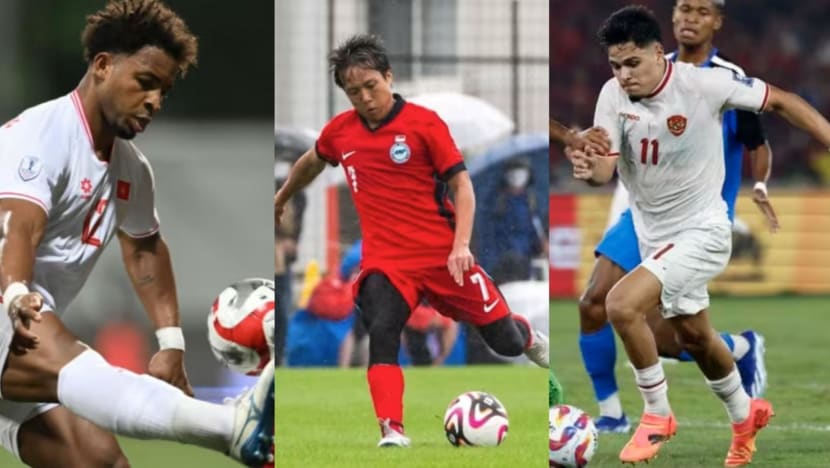
From left to right: Vietnam's Nguyen Xuan Son, Singapore's Kyoga Nakamura and Indonesia's Ragnar Oratmangoen. (Photos: Wallace Woon, Football Association of Singapore, Reuters/Willy Kurniawan)

This audio is generated by an AI tool.
SINGAPORE: At the recently concluded ASEAN Championship, one footballer caught the eye.
He netted seven goals in just five appearances, terrorising defenders with a potent blend of physicality, speed and clinical finishing.
Despite a serious injury which saw him stretchered off in the second leg of the final and sent for surgery, Nguyen Xuan Son was instrumental in leading Vietnam to their third regional title.
In his debut tournament, the 27-year-old took home both the most valuable player and top scorer awards.
But Xuan Son wasn't born in Vietnam, nor does he have familial ties to the country.
He was born Rafaelson Bezerra Fernandes in Brazil.
After featuring for club sides in Japan and Denmark, he moved to Vietnam's top league and in December 2024, fulfilled a five-year residency requirement to play for his adopted country. With that, he also adopted a new name.
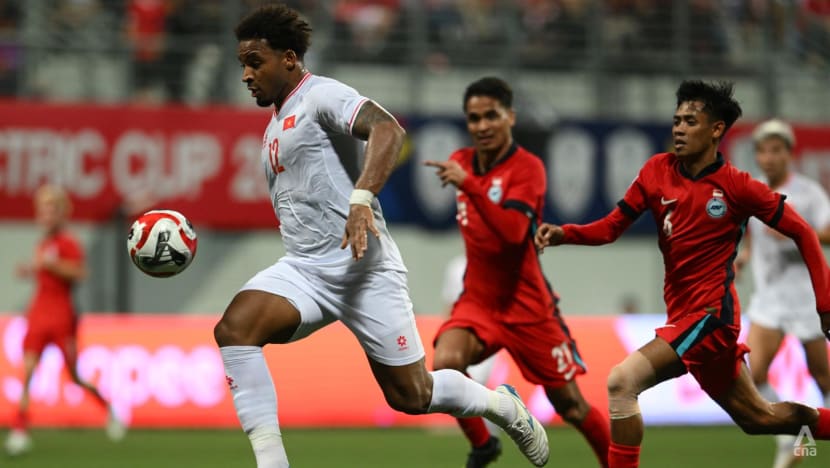
Xuan Son could represent the changing face of football in the region.
At the ASEAN Championship which concluded in January, players born in Japan, Colombia, South Africa, Argentina, Sweden, Norway and Ivory Coast featured.
Naturalisation of such foreign-born players is "changing the competitive complexion of Asian football", said freelance football writer Paul Williams.
"And it's going to continue to change it as nations continue to go down this path."
CHANGING THE GAME
In 2004, world football governing body FIFA introduced measures where any player taking up a new nationality without a "clear connection" to that country would need to have lived there for at least two years, or have a parent or grandparent born there, to play for said country.
This "clear connection" could take the form of birth or ancestral connections.
In 2008, the residency requirement was extended to five years.
Singapore were one of the early pioneers of naturalisation of athletes, with a Foreign Sports Talent Scheme introduced by the table tennis association and later adopted by the Football Association of Singapore (FAS).
This led to the likes of Nigeria-born Agu Casmir, Serbia-born Mustafic Fahrudin and China-born Shi Jiayi taking up citizenship.
These naturalised players played integral roles as Singapore won the ASEAN Championship in 2004, 2007 and 2012.
Former Singapore head coach Radojko "Raddy" Avramovic, who presided over all three titles, said: "If you ... have the opportunity or the right to bring in (a foreign-born player) who can play for the national team, why not?"
Today, other Southeast Asian nations like Vietnam, Cambodia and Malaysia have similarly called up players who meet FIFA's residency requirements but have no birth or ancestral connections to their country.
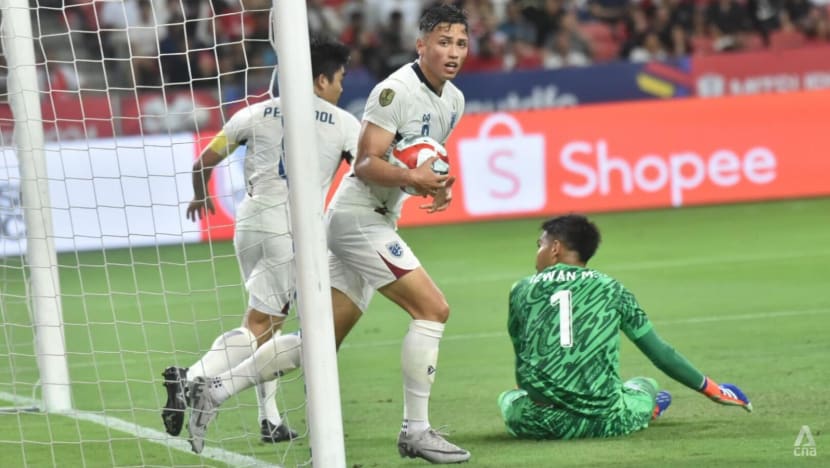
Others have tapped on pools of foreign-born "heritage" players with at least a parent or grandparent born in the country.
"The world has become connected in ways that it wasn't two, three, four generations ago ... That is breeding a new generation of talents that have mixed heritage and mixed parents," said Williams.
"That has changed the game ... So many teams in Europe have players that weren't born in the country, so it's only natural that that would happen within Asia as well."
One example is Thailand, whose ASEAN Championship squad had a number of players of mixed parentage - including Nicholas Mickelson (Norwegian father and Thai mother) and Patrik Gustavsson (Swedish father and Thai mother).
According to freelance football writer Paul Murphy, both Thai footballing authorities and clubs have been actively scouting for such players.
But there has been "zero conversation" about naturalising foreign players with no roots to Thailand.
"It just doesn't exist as a concept, not just in football but in Thai society as a whole," said Murphy, who authored a book about footballer Charyl Chappuis, one of the first mixed heritage players to represent the War Elephants.
THE INDONESIAN INITIATIVE
One Southeast Asian nation has of late ratcheted up their push to incorporate foreign-born players by several notches.
Indonesia’s first-ever naturalised footballer was actually Uruguayan striker Christian Gonzales, who was granted citizenship in 2010.
But it was in 2023, when businessman and politician Erick Thohir took the helm of the Indonesian football association (PSSI), that the country’s naturalisation policy went into overdrive.
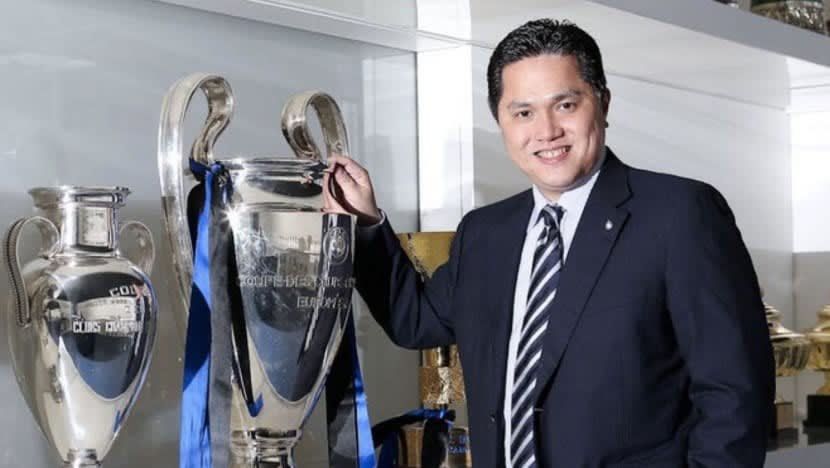
That same year, five foreign-born players with some form of Indonesian heritage were naturalised.
Among these were defenders Justin Hubner from English Premier League club Wolverhampton Wanderers and Jay Idzes from Italian Serie A side Venezia.
The PSSI has focused on the Netherlands, a country with a sizable Indonesian diaspora and known for producing some of the world’s best footballers.
With the exception of Jordi Amat (Spain) and Sandy Walsh (Belgium), most of the recently naturalised Indonesian players were born in the Netherlands, including goalkeeper Maarten Paes who plays in the United States and defender Kevin Diks who plays in Denmark.
Speaking on a podcast in August last year, Hamdan Hamedan, an adviser at the Indonesian Ministry of Youth and Sports, pointed to a database of at least 100 footballers with blood ties to the country.
He said Indonesia works with agents and scouts in Europe to analyse and approach the players about the possibility of joining the national team.
“Nowadays, it is common to see 90 per cent of Indonesia’s starting line up comprised of naturalised players,” Kesit Handoyo, a journalist turned football commentator told CNA.
“It is clear that (these naturalised players’) qualities are at another level compared to the local players, because most of them play in Europe.”
TURNING FORTUNES AROUND
When Thohir became chairman of PSSI, he promised to guide Indonesia into the top 100 of FIFA's world ranking.
“To do this, Indonesia can either fix its league and improve its local players' quality, which can take five to ten years," said Justinus Lhaksana, a former coach turned sports commentator.
"Or Indonesia can do it instantly through naturalisation.”
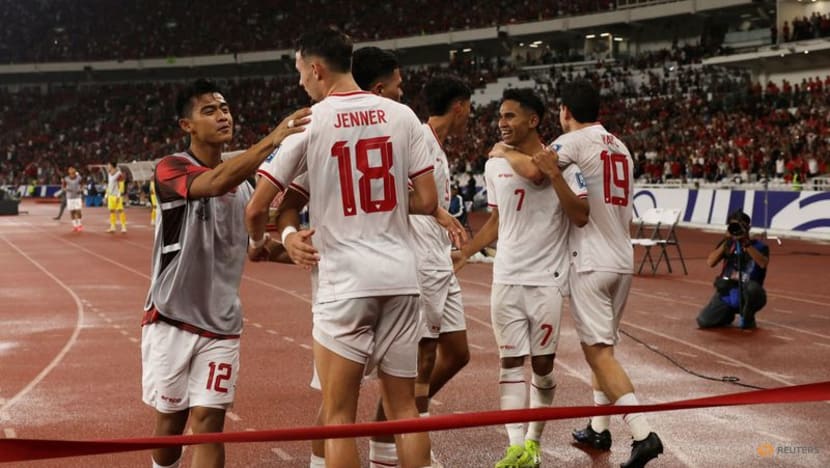
Williams, the writer, said that with the game becoming more professional, every national team will look for any edge it can get.
"And if they do have access like Indonesia do, to a collection of players that are playing at a higher level than what their domestic players are, that's a natural advantage ... If they don't (utilise) that, they are disadvantaging themselves."
The new-look Indonesia's results have been largely impressive thus far.
For the first time in history, they advanced to the knockout stage at the 2023 Asian Cup, before losing to heavyweights Australia.
At the recent World Cup qualifiers, they held Australia to a 0-0 draw and stunning Saudi Arabia 2-0. They still have four matches left and remain in the running to qualify directly for the 2026 World Cup.
“We have seen significant improvements in (Indonesia’s) national team’s performance and this would not have been possible without these naturalised players,” said Kesit.
Sports broadcaster and former professional footballer Rhysh Roshan Rai described naturalisation as akin to outsourcing player development to another country.
"You can ... let some other country develop them and then bring these players in to represent (you)," he said. "Everyone talks about development taking 10 to 15 years. With this method, you can sort of get it in the here and now."
Veteran football coach Steve Darby said naturalisation has increased over the years as it's become a way of improving a national team's performance.
"The advantages are quite simple - it can increase the chances of a nation winning games."
It then follows that coaches, who "live and die on results", are often in favour of naturalisation, said the Englishman.
And with the World Cup expanding from 32 to 48 teams in 2026, Asian countries are aiming high, added Williams.
"These nations can now all of a sudden start to dream and think: 'Ok, now we can potentially go to a World Cup. How can we improve our team to get to a World Cup?' And naturalisation is one way they can do that."
For Southeast Asia in particular, there could be a level of frustration over never coming anywhere near global success or making an impact on a World Cup, said fellow writer Murphy.
"From that perspective, it's probably understandable that they are looking at it saying ... 'maybe this is the way to go'."
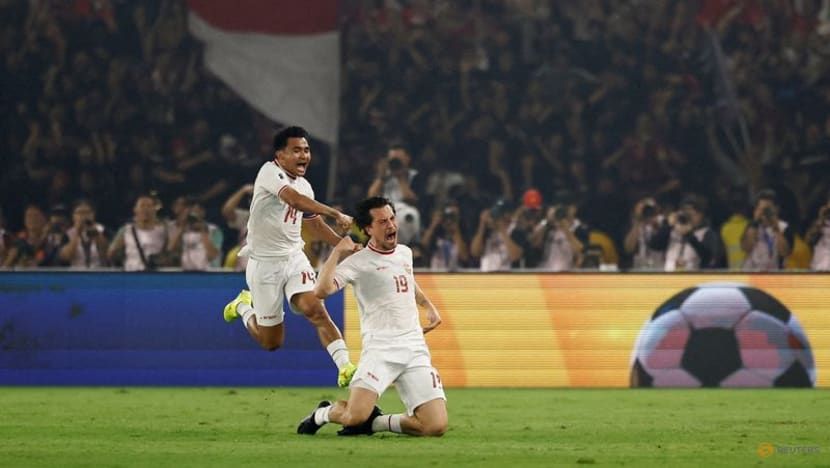
YOUTH PIPELINE STILL KEY
In Indonesia, most fans appear to be on board. A November survey by a research firm found that 71.5 per cent of respondents felt where a player is born should not matter so much.
“What matters is that they have Indonesian blood and they pledge loyalty to the nation,” said 35-year-old Rizky Adrian.
“The diaspora is really elevating the way we play. I hope they can pass on their skills, knowledge and passion to others, so the locals are also motivated to elevate their game.”
Yet some think there should be a limit, at least on the number of players naturalised.
“Sports is supposed to be about nurturing talents and giving them a chance to rise and shine," said 43-year-old Indonesian Widi Mahendra.
"It must be really demotivating for local players to see their spot at the national team and their chance to represent their country at the international level taken away by players brought in from overseas."
“Even if they win, it takes away the joy of watching the national team win a bit," he added.
"I worry that we are becoming too dependent on naturalised players while the local players are on the bench (as substitutes)."
Naturalisation can create "internal disharmony" as well, stressed Darby, who has coached all over Asia.
For example, a player who could have been capped 50 times by his country might see this number reduced to 20 after a foreigner takes his position in the pecking order. There are also impacts on economic and sponsorship benefits, contractual renewals at club level or "just plain pride", Darby added.
Football commentator and ex-footballer Shasi Kumar noted that while a player must bring quality to the team, it's also important that he's there for "the right reasons".
He added that the individual also must contribute after retiring from professional football, giving the positive example of Fahrudin, who's now assistant coach of Singapore Premier League outfit BG Tampines Rovers.
"We've got to be very, very careful of how we do it. We have to give it to the right players," said Shasi.
The issue of over-dependence on naturalised players was highlighted at the recent ASEAN Championship, when Indonesia were eliminated in the group stage.
With the tournament not on FIFA’s calendar, many naturalised players were not released by their European clubs. Indonesia opted to send a squad of almost all under-22 players, with the only naturalised footballer being Brisbane Roar's Rafael Struick.
The team failed to advance to the knockout rounds after losses against Vietnam (0-1) and the Philippines (0-1); a 3-3 draw against Laos; and a 1-0 win over Myanmar.
“It showed that Indonesia’s local players have a lot of catching up to do and this is something which PSSI needs to address,” said Kesit, the commentator.
Eventually, Indonesia will have to face the question of what happens if or when their talent pool of potential players in the Netherlands runs dry, said Williams.
"That generation of players that have links to Netherlands through parents or grandparents is going to diminish, because the colonial links between the countries ended a long time ago," he explained.
"This is probably going to be one of the last generations of talents that actually have that connection."
Youth development must run parallel to naturalisation, stressed those who CNA spoke to.
"You also still need to focus on ensuring that you are still committing resources to developing local talent as well, because that is what fans resonate with," added Williams.
"Fans resonate with local heroes and that's something that federations and nations need to be mindful of ... The whole idea behind it is inspiring the next generation, but if there's a disconnect and you're not inspiring local players, then it's going to create problems for future generations as well."
Sports broadcaster Rai said that fans have more of a connection with players who've grown up with them or gone through the same struggles, and are now out there representing them.
"To me, there is a lot more joy, a lot more pride in that sense."
Speaking to CNA, the father of a young player capped by Indonesia said his son was relishing the challenge of testing himself against the foreign-born footballers.
"If you are able to compete with all these players, then you know that you are good enough to play at a higher level," said the man, who did not want himself and his son to be named.
"These naturalised players come through academies and clubs of excellent names in Europe. (My son) feels that there's always something to learn from them."
The man said he was supportive of Indonesia's current approach to naturalisation, given that the players still have ties to the country.
But he conceded that it could potentially make it more difficult for youngsters to make it to the national team.
Last September, Singapore's Minister for Culture, Community and Youth Edwin Tong also stressed the importance of having players who "can relate to Singapore and Singaporeans".
"Because I don’t want a team that is made up of people who wear my jersey, have my flag; but I don’t know them," he said while speaking on CNA programme Talking Point.
Mr Tong noted that Singapore's earlier reliance on naturalised players in achieving regional success had "papered over the cracks".
"The real fundamental problem was we weren’t building a pipeline of young players. And then the moment we stopped having naturalised players, that got exposed."
THE PLAYERS' PERSPECTIVE
Cambodia's captain Kan Mo, who was born in South Africa, said that it's not only about naturalised players coming in to make teams stronger.
It's also about "helping the local players push themselves even more so that we are stronger as a team, as a unit", he said.
For Singapore's latest naturalised player Kyoga Nakamura, the decision to take up citizenship was driven by a desire to give back and contribute to the country.
"Singapore gave me a lot of special moments," the native Japanese midfielder said.
It also helped that his wife and daughter "really love to stay in Singapore".
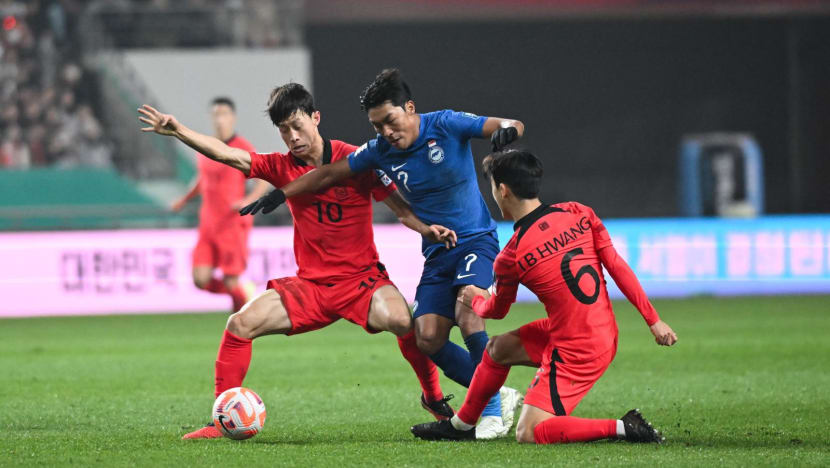
Being able to represent Singapore is something "honourable" and "meaningful" to South Korea-born Song Ui-young, who was naturalised in 2021.
"I started professional football here ... I'm happy here, while I'm working here I could take care of my family as well," he said, adding that it's important for naturalised players to try to understand the culture of a country.
Both Song and Nakamura had to overcome the language barrier in the beginning, though they speak good English today.
They credited their clubs and teammates for making the extra effort to reach out to them and make them feel included.
Singapore football fan Eddy Hirono said players like Song and Nakamura add value to the Singapore team. Both have not only stayed in the country for a number of years but also made an effort to connect with the fans, he added.
"This is an indicator to me that they care about the community they reside in," Hirono said. "Whenever they put on the shirt, you can see that they really care."
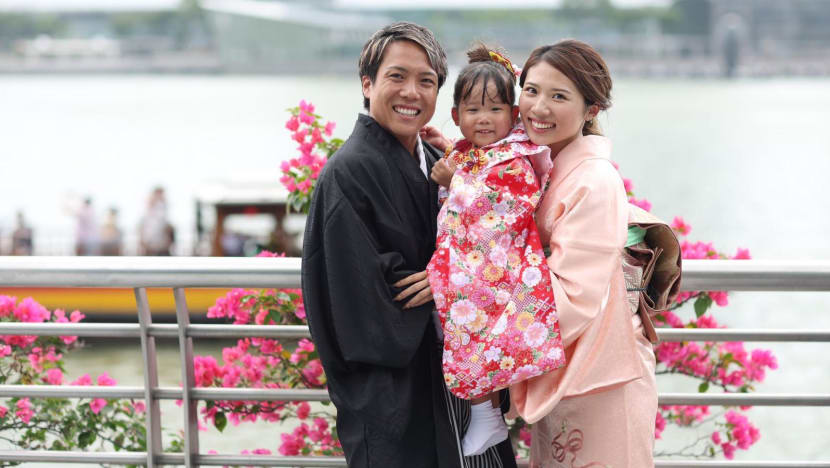
FAS president Bernard Tan told CNA that developing a "robust and sustainable football ecosystem" is the most "sustainable and relatable path" to long-term success for Singapore.
"We focus on growing the base of players and prioritising the development of our local players from a young age," he added.
Pointing to the Unleash The Roar (UTR) initiative, he said "building blocks" have been put in place to strengthen youth development pathways, enhance coaching standards and create more opportunities for aspiring footballers.
There's a place for naturalisation in this system, he said.
"At the same time, we also welcome talents who want to be part of us. Naturalisation, when done selectively, can complement our efforts to develop local players and homegrown talent, but is not a core policy that our football ecosystem relies on," said Mr Tan.
"Athletes considered for naturalisation must not only possess exceptional sporting talent that enhances and complements our existing local talent, but also show a deep connection to Singapore both on and off the pitch."
FULL PITCH AHEAD
For now, Indonesia continues to go all in on its naturalisation policy.
Earlier this month, the PSSI dropped a bombshell that it would be replacing South Korean coach Shin Tae-yong with Patrick Kluivert, a former striker for the Dutch national team.
“The level of our diaspora players is getting higher and they need a coach that they will listen to … someone respected in Europe, in the Netherlands,” Arya Sinulingga, a member of PSSI’s executive committee, told Indonesian journalists on Jan 8.
Arya added that Kluivert will also be tasked with finding and approaching potential naturalisation recruits.
PSSI executives later said Indonesia will continue its naturalisation programme.
“Those criticising our naturalised players are just jealous of our achievements,” Arya said in an interview with Indonesian news outlet Kumparan on Jan 10.
“We are revamping our national team first. Once we are done, we will make improvements in other areas.”
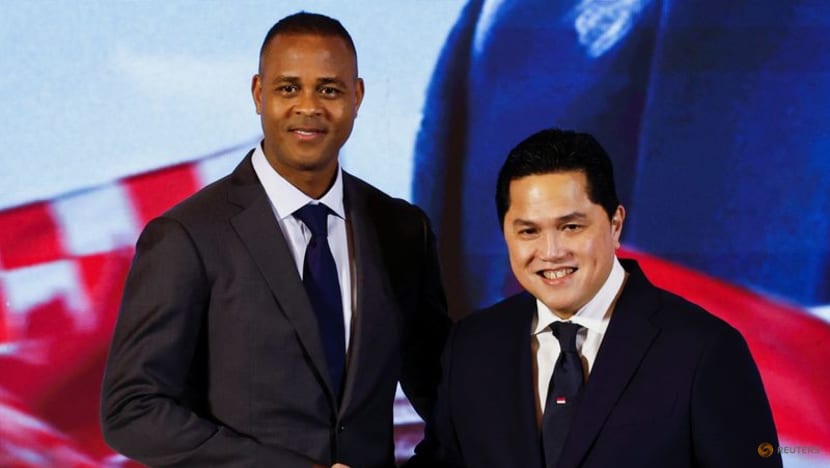
Indonesian sports journalist and football commentator Firzie Idris is another supporter of naturalisation.
“As long as FIFA rules and regulations allow it, any nation should be free to naturalise as many players as they can afford, not just Indonesia," he said.
"And this has become common practice not just in football but other sports as well, because the world is changing into one that is becoming more and more borderless."
Most observers CNA spoke to said the way forward for nations could be to develop a hybrid model of naturalising foreigners while continuing to invest in locals.
An example of this is Vietnam, which has a good track record at the youth level and offered citizenship to Brazil native Xuan Son to add quality up front.
'We've seen already how much of a big difference he makes. Vietnam were already a good side, most of these players were locally developed, but this was an area they needed some external help with," said Rai.
The former professional footballer said he doesn't see naturalisation going away in the next five to 10 years and that it's probably going to be "intensified" even more.
Football writer Williams added that he had no issues with nations using nationalisation as a "tool" as long as it is within the rules.
But naturalising players is not the answer to everything, he reiterated.
"It is essentially a stop-gap solution ... Indonesia have taken that to the nth degree, but generally speaking nations are using it to fill gaps in spots they are having trouble with," he said.
"But unless you're developing your local talent, you're going to continue to struggle, no matter how many players you naturalise."

















